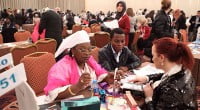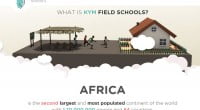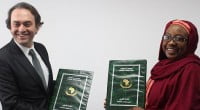Keyword: Africa

Hizmet Movement: Partners We Want
A Turkish political, non-governmental, civil society organisation, Hizmet Movement, has made commendable contributions in Nigeria’s socio-economic life. The movement, which began in the late 1960s, particularly focuses on education, charity and dialogue, which it believes are the remedies to ignorance, poverty and disunity.

African Union Commission chair visits Turkish school
Nkosazana Dlamini-Zuma, the chairperson of the African Union (AU) Commission, paid a visit to a Turkish school established by volunteers of the Gülen movement, which is inspired by the teachings of Turkish Islamic scholar Fethullah Gülen, in the South African city of Durban, saying its students are “privileged” to be educated there.

African Union Commission chair supports creation of more Turkish schools
Nkosazana Dlamini-Zuma, the chairperson of the African Union (AU) Commission, said on Tuesday during a visit to Johannesburg that volunteers working for the faith-based Gülen movement — inspired by the teachings of Turkish Islamic scholar Fethullah Gülen — should continue to build schools and other institutions in Africa.

Report reveals repercussions of AK Party fight against Gülen movement in Africa
A report released by the prestigious London-based think tank Chatham House has praised the efforts of the faith-based Gülen movement in Sub-Saharan Africa (SSA), saying that it has been a major driving force of Turkey’s engagement in the region; however, it has warned that the Justice and Development Party’s (AK Party) ongoing battle against the movement may hamper further Turkish presence there.

Fethullah Gülen’s message to Turquiose Harmony Institute “Peace and Dialogue Awards”
The awards were organized by the Turquoise Harmony Institute, a dialogue center inspired by prominent Turkish Islamic scholar Fethullah Gülen to promote mutual understanding and exchange between people from different cultures and religions.

Kimse Yok Mu to launch 1000 “field schools” project in Africa
International aid organization Kimse Yok Mu is launching a new project to help improve education in Africa – KYM Field Schools. The project is about the foundation of 1000 schools for primary education of African children and submission of schools to local authorities.

African Initiative on Education for Peace and Development through Inter-religious and Intercultural Dialogue
African Heads of states and religious leaders have launched the ‘African Initiative on Education for Peace and Development through Inter-religious and Intercultural Dialogue’ in Cotonou, Republic of Benin.

Africa, Albania and Erdogan’s campaign against Turkish schools
The Turkish president, who has not ceased making unsubstantiated allegations against his perceived opponents, had during his official visit to Albania called for the closure of the Turkish schools in the country, claiming that the schools were established by a terrorist organization.

Senegal minister: Turkish schools’ students our hope for the future
Welcoming the students of the Yavuz Selim Education Institutions after their success in international competitions, Aly Ngouille Ndiaye, the industry and mines minister of Senegal, said the students of the Turkish schools are encouraging hope for the future of the country.

Why Kimse Yok Mu probe may affect education in Nigeria
To some, the name Kimse Yok Mu might not ring a bell in Nigeria, but to those that follow this secular charity organisation, especially its scholarship programme in Nigeria that has made it possible for many underprivileged persons to go to school, the NGO may simply be the best thing to happen in Nigeria’s education sector.






















